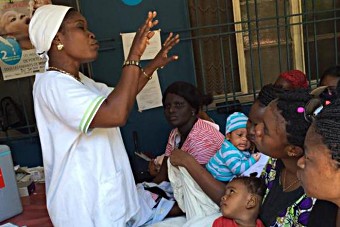
Credit: Gavi/2015/Frédérique Tissandier.
Kinshasa, 28 April 2015 – More than two million children in the Democratic Republic of Congo will benefit from Inactivated Polio Vaccine (IPV) every year as the country celebrates African Vaccination Week by introducing the vaccine into its routine immunisation schedule.
An official ceremony to launch the phased-introduction of the life-saving vaccine, which will be offered to all children born across the country each year, was held under the leadership of Prime Minister Augustin Matata Ponyo at a new health centre in Mbankana, Maluku II health zone.
The first doses of the vaccine will be delivered this month in four provinces (Bandundu, Bas Congo, Equateur and Kinshasa),a further four provinces (Kasaï Occidental, Kasaï Oriental, Katanga and Maniema) will introduce the vaccine in May and children in the final three provinces (North and South Kivu, Province Orientale) will receive the vaccine in June.
“As long as a child somewhere is not protected against this crippling disease, every child is at risk,” said Anuradha Gupta, deputy CEO of Gavi, the Vaccine Alliance. “Gavi fully supports the government in its efforts to strengthen its immunisation system as high routine coverage establishes a strong base for population immunity to prevent polio outbreaks and builds a sustainable platform for the introduction of IPV and other lifesaving vaccines. Immunisation is not just about protecting children against a disease, it is about unlocking the productivity potential of individuals, communities and countries.”
As long as a child somewhere is not protected against this crippling disease, every child is at risk
Anuradha Gupta, Gavi Deputy CEO
Strong routine immunisation systems are critical to reach polio elimination targets and prevent thousands of cases of disease and death. The Democratic Republic of Congo, with support from its partners, has improved its routine immunisation coverage and seen the percentage of children receiving DTP3 (three doses of diphtheria, tetanus, pertussis) rise from 25% in 1999 to 72% in 2013. However, geographical challenges as well as conflicts and insecurity have resulted in large differences between provinces.
DRC has been polio-free since the end of 2011 but for many years it was among the most affected countries worldwide. The year before DRC was declared polio-free, 93 cases were recorded. The challenge now for the Congolese health system and other partners is to make sure that polio does not return, and increase routine immunisation coverage against other diseases.
"Polio, which for decades has crippled many people around the world, was drastically reduced last year in our continent with only 17 cases in total, the lowest number ever reached. We are very close to reaching the target zero cases and eradicating this scourge from the African region by the end of 2018,” said Dr. Deo Nshimiriman, Representative ad interim of the World Health Organization in the Democratic Republic of Congo.
He stressed that African Vaccination Week (AVW), which starts today, and a series of Local Immunization Days that will follow from April 30 should consolidate achievements in immunisation and are opportunities not to be missed. “It is time to make substantial and sustained investments to strengthen health systems in DRC,” added Dr Nshimirimana.
In May 2013, the World Health Assembly endorsed the Polio Eradication & Endgame Strategic Plan 2013-2018, calling on countries to strengthen routine immunisation programmes and introduce at least one dose of IPV as a lead up to the phased removal of oral polio vaccines (OPV).
OPV is widely used in developing countries and while it has successfully reduced polio cases by 99% worldwide, adding IPV to routine immunisation programmes will further improve immunity and help reduce the risks associated with vaccine-derived polioviruses.
“The introduction of IPV is a fundamental step towards the aim of eradicating polio globally by 2018 and it will strengthen DRC’s position as polio-free, which it has been since 2011,” said UNICEF Representative in DRC, Pascal Villeneuve. “Immunisation remains the most cost-effective intervention to reduce the number of cases of disease and disability in children. Together with its partners, DRC is making sure that its children enjoy their right to be vaccinated and protected so they can grow, develop and lead healthy lives.”
Last year more than 350 cases of wild polio virus were recorded, mostly in Pakistan, which, along with Afghanistan and Nigeria, is one of the three countries where polio is considered endemic by the World Health Organization (WHO). However, no new wild poliovirus cases have been recorded in over six months in Africa leading to hopes that the continent is on the verge of being polio-free. Since the beginning of 2015, 22 cases1 have been reported mostly in Pakistan.
Gavi is currently supporting countries to accelerate the introduction of IPV, through funding from the Global Polio Eradication Initiative (GPEI), as well as strengthening routine immunisation and health systems in the 73 countries it works with. DRC is the eighth Gavi-supported country to introduce IPV. Nepal became the first in September 2014, only 10 months after Gavi announced its support for countries to introduce the vaccine.
1 http://www.polioeradication.org/Dataandmonitoring/Poliothisweek.aspx
Gavi, the Vaccine Alliance is funded by governments (Australia, Brazil, Canada, Denmark, France, Germany, India, Ireland, Italy, Japan, the Kingdom of Saudi Arabia, Luxembourg, the Netherlands, Norway, the People’s Republic of China, Republic of Korea, Russia, South Africa, Spain, the State of Qatar, the Sultanate of Oman, Sweden, United Kingdom, and United States), the European Commission, the OPEC Fund for International Development (OFID), the Bill & Melinda Gates Foundation, and His Highness Sheikh Mohamed bin Zayed Al Nahyan, as well as private and corporate partners (Absolute Return for Kids, Anglo American plc., the A&A Foundation, The Children’s Investment Fund Foundation, Comic Relief, the ELMA Vaccines and Immunization Foundation, JP Morgan, Kuwait Youth Committee, “la Caixa” Foundation, LDS Charities, Lions Clubs International Foundation, UPS and Vodafone.
Click to view the full donor list.

